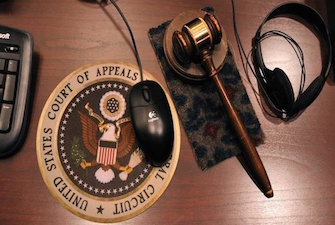 First Data Corp. v. Inselberg, (Fed. Cir. Sep. 15, 2017) (Before Newman, O’Malley, and Stoll, J.) (Opinion for the court, O’Malley, J.)
First Data Corp. v. Inselberg, (Fed. Cir. Sep. 15, 2017) (Before Newman, O’Malley, and Stoll, J.) (Opinion for the court, O’Malley, J.)
Eric Inselberg is the inventor of patents disclosing systems by which audiences can interact with live events, including concerts and football games. The patents were formally held by Inselberg Interactive, also a party to the appeal. Interactive received a $500,000 loan from Frank Bisignano in 2010, which Inselberg personally guaranteed. In exchange for the loan, Inselberg gave Bisignano a security interest in his patent portfolio. In 2011, Inselberg and Interactive defaulted on the loan and entered into an assignment agreement whereby Interactive transferred “all right, title and interest” in its patents to Bisignano. Shortly after, Bisignano became CEO of First Data.
In October 2014, Inselberg met with Bisignano claiming that First Data was using his patents without a license and that the assignment to Bisignano was invalid. In October 2015, Inselberg’s counsel sent Bisignano and First Data a draft complaint, asserting a number of state law claims and seeking a declaration that Inselberg and Interactive were the true owners of the patents and were entitled to sue for infringement. In November 2015, Inselberg’s counsel sent Bisignano and First Data a second draft complaint and stated that it intended to file the complaint unless the parties reached a settlement.
Bisignano and First Data responded by seeking a declaratory judgment, in district court, that the assignment agreement was valid and that First Data did not infringe. Shortly thereafter, Inselberg and Interactive filed a complaint in New Jersey Superior Court, asserting various state business tort and contract claims and seeking a declaration that the assignment agreement was invalid and that Interactive owned the patents. Bisignano and First Data removed the state court action to district court, invoking the federal court’s jurisdiction over patent cases. They also counterclaimed, seeking a declaration that the patents were not infringed and that at least one of the patents in the portfolio was invalid.
Inselberg and Interactive filed a motion to dismiss Bisignano and First Data’s declaratory judgment claims and state court counterclaims, and moved to remand the action to state court. The district court agreed, finding that it lacked jurisdiction over Inselberg and Interactive’s claims that the assignment agreement was invalid. Those claims were based on questions of state law and did not depend on any federal issues or interpretations of federal law. First Data’s invalidity and infringement counterclaims were deemed “incidental and contingent” to Inselberg and Interactive’s ownerships claims and could not be resolved unless or until a state court determined that Inselberg and Interactive owned the patents. First Data and Bisignano appealed the district court’s dismissal of its claims and its order to remand.
On appeal, First Data and Bisignano argued that the district court erred in dismissing its declaratory judgment claims and counterclaims of invalidity and non-infringement. Patent ownership, they argued, is a merits issue, not a jurisdictional issue. In recent years, the Supreme Court has explained that if Congress does not treat an issue as jurisdictional, “courts should [also] treat the restriction as non-jurisdictional in character.” Arbaugh v. Y&H Corp., 546 U.S. 500 (2006). However, in the same case, the Supreme Court held that a claim invoking federal jurisdiction should be dismissed if it is “immaterial and made solely for the purpose of obtaining jurisdiction” or is “wholly insubstantial and frivolous.” Thus, “[t]o invoke the jurisdiction of a federal court . . . it is necessary that plaintiff allege facts that demonstrate that he, and not the defendant, owns the patent rights on which the infringement suit is premised.”
The Federal Circuit found that Arbaugh controlled the appeal and it affirmed the district court’s dismissal of the patent and declaratory judgment claims for lack of jurisdiction. The Court found that by filing the state court action challenging the validity of the assignment agreement, Inselberg and Interactive admitted that they did not own the patents, and could not pursue patent claims, unless and until a state court found that the assignment agreement was invalid. As a result, Bisignano and First Data’s invalidity and non-infringement claims were frivolous under Arbaugh because Inselberg and Interactive did not own any patents that Bisignano or First Data could infringe or invalidate. Even if the claims were not frivolous, they were premature, because they rested upon “contingent future events that may not occur as anticipated, or indeed may not occur at all.”
First Data and Bisignano also challenged the district court’s remand of the state law claims. The Court noted that under 35 U.S.C. § 1447(d), it cannot review an order remanding a case to the state court from which it was removed if the district court remanded the case after finding that it lacked subject matter jurisdiction over the claims. Because the district court’s decision to remand the case to state court was based on a lack of subject matter jurisdiction under 28 U.S.C. § 1447(c), the Court was precluded from reviewing the remand order.
The Federal Circuit does not have subject matter jurisdiction to review state law claims seeking a declaration that an assignment of patent rights was invalid. The Federal Circuit does not have jurisdiction to review a district court order remanding state law claims to the state court from which the case was removed if the district court remanded the case for lack of subject matter jurisdiction over the claims.
[Troutman-Ad]
[Troutman-About]

![[IPWatchdog Logo]](https://ipwatchdog.com/wp-content/themes/IPWatchdog%20-%202023/assets/images/temp/logo-small@2x.png)


![[Advertisement]](https://ipwatchdog.com/wp-content/uploads/2024/03/IP-Copilot-Apr-16-2024-sidebar-700x500-scaled-1.jpeg)
![[Advertisement]](https://ipwatchdog.com/wp-content/uploads/2024/04/Patent-Litigation-Masters-2024-sidebar-early-bird-ends-Apr-21-last-chance-700x500-1.jpg)

![[Advertisement]](https://ipwatchdog.com/wp-content/uploads/2021/12/WEBINAR-336-x-280-px.png)
![[Advertisement]](https://ipwatchdog.com/wp-content/uploads/2021/12/2021-Patent-Practice-on-Demand-recorded-Feb-2021-336-x-280.jpg)
![[Advertisement]](https://ipwatchdog.com/wp-content/uploads/2021/12/Ad-4-The-Invent-Patent-System™.png)







Join the Discussion
One comment so far.
Andrew Schwerin
October 3, 2017 09:01 amHi Gene or Admin –
Your link to the CAFC decision is wrong and goes to Waymo v. Uber arbitration decision. Could you fix when you get a chance?